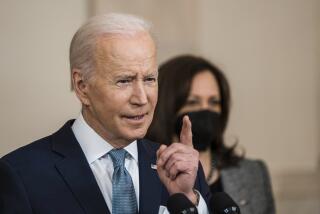President Obama faces tough challenge in Libya speech
- Share via
Reporting from Washington — President Obama faces one of the more difficult public relations challenges of his presidency in Monday evening’s speech on Libya, and he will carefully seek to thread a number of rhetorical needles in order to get what appears to be a fairly subtle message across to the American public.
Along the lines of the United Nations mandate under which the United States is operating, the president must outline America’s role in the Libyan conflict in humanitarian terms, while making clear that the situation in the North African country differs from other situations, past and present, in which citizens have suffered at the hands of a despotic regime.
Obama will seek to define the scope of the U.S. military’s involvement in limited terms, while also making it clear to the nation, and the world, that American commitments are lasting ones.
He’ll face some skepticism. The public is edgy — and, according to a new poll from the Pew Center for the People & the Press, largely unclear about the ultimate objective in Libya.
Half of those surveyed, Pew said Monday, said the military operation by the U.S. and its allies has no clear goal, while just 39% said it does. The good news for the administration: Public approval of the campaign is holding at around 47%, with 36% responding that U.S. intervention in the Libyan conflict was a mistake.
Republicans have seized on the uneasiness. “If the American people are uncertain as to our military objectives in Libya, it’s with good cause,” Senate Minority Leader Mitch McConnell (R-Ky.) said Monday.
“The president has articulated a wider political objective of regime change in Libya that is not the stated objective of our military intervention; nor is it the mandate of the U.N. resolution that the president has used as a justification for our military efforts there,” McConnell said. “So now that the objective of establishing a no-fly zone has been reached, and our NATO allies are ready to assume the command and execution of this mission, it’s fair to ask: What is the role of our military and military alliance in providing support to an opposition that we are only now beginning to understand?”
Yet, Republicans must be careful with their response to the president’s words as well. Should the allied effort help result in the overthrow of Moammar Kadafi and the installation of a friendlier government in Libya, Obama will appear prescient. It’s one reason why some potential GOP presidential contenders have been cautious in addressing the administration’s actions.
But the president is also facing pressure from some Democrats on the Hill. Sen. Robert Menendez of New Jersey said Monday that he wants Obama to more clearly label Kadafi as a threat to national security.
“Kadafi is a terrorist — the moral equivalent of Osama bin Laden — a man who ordered the bombing of Pan Am Flight 103, which killed 270, including 34 New Jerseyans, and who in 2009 swapped a lucrative oil deal in exchange for the release of the convicted Pan Am bomber. A man President Ronald Reagan referred to as ‘this mad dog of the Middle East’ because of his relentless instigation of and support for terrorism. A man who has trained terrorists in North Africa and has proven that his reign of terror extends well beyond his own national and regional borders.,” Menendez said in a statement. “There is no question that, if given the chance, Kadafi will continue to support terrorism and, therefore, continue to threaten Americans at home and abroad. “
In television interviews Sunday, Secretary of State Hillary Rodham Clinton and Defense Secretary Robert M. Gates spoke is more modest and less threatening terms regarding Kadafi, saying that while Kadafi’s regime didn’t endanger a “vital interest” of the U.S. , there remains an interest in protecting Libya’s citizens, supporting U.S. allies in Europe and aiding the democracy movements in the Middle East.
Other members of Congress are still unhappy that Obama, so far, has done little to indicate he will seek congressional ratification of the U.S. involvement, something obtained by President George W. Bush in 2001 and 2002 with respect to Afghanistan and Iraq, respectively.
“If the U.S. wants to lead and inspire the world in setting the standard for good governance, getting this executive-legislative relationship right is critical,” Rep. Michael M. Honda (D-San Jose) said Monday.
Matt Bennett, an analyst at Third Way, a centrist think-tank in Washington, said that Obama should seize upon progress, such as it, achieved by rebel forces in Libya to show that American involvement has made a difference.
“He’s got to articulate for the American people exactly what’s going on in Libya,” Bennett said. “Take advantage of momentum that’s been gained. Use that to explain what we’re doing there.”
But celebrating the rebel cause while maintaining that U.S. policy doesn’t formally call for Kadafi to leave won’t be easy.
Obama will have to explain how a humanitarian crisis can be averted in Libya without the U.S. ensuring that Kadafi is removed, while at the same time, reassuring the public that the U.S. can achieve its goals without using ground forces, Bennett said.
“There are a lot of humanitarian crises around the world and most of them aren’t going to be responsive to air power, but it so happens this one is,” he said.
More to Read
Get the L.A. Times Politics newsletter
Deeply reported insights into legislation, politics and policy from Sacramento, Washington and beyond. In your inbox twice per week.
You may occasionally receive promotional content from the Los Angeles Times.










